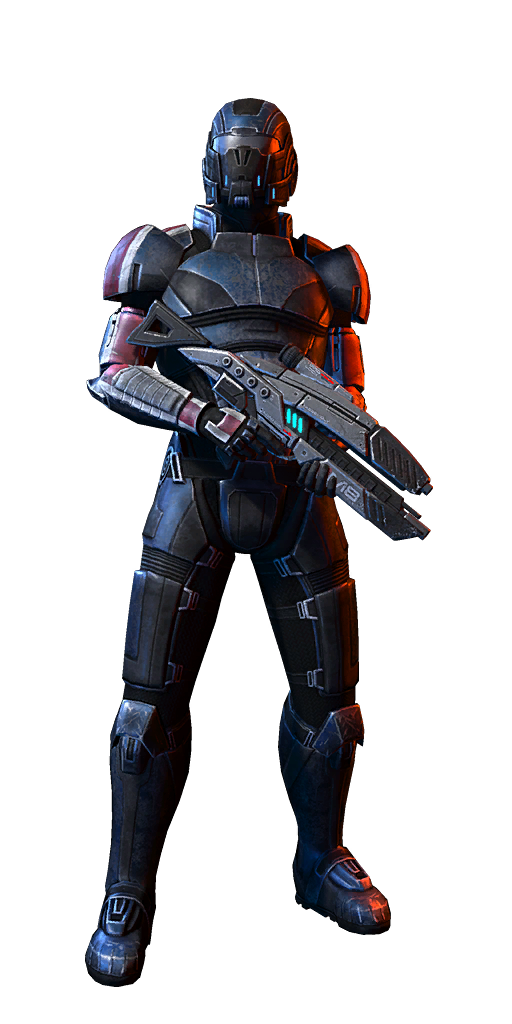Human (Mass Effect Supplement)
Human[edit]
Physical Description[edit]

|
|---|
| [Source] |
In the one hundred years between today and humanity's presence in the wider galaxy, humanity hasn't changed much. Physically, humans are most comparable to turians, being slightly more physically fit than salarians (though slightly out classed in speed), but slightly less than asari. All cases of biotics in humans are the result of pre-natal exposure to element zero, which carries a high risk of medical complications.
Compared to almost every other race, humanity bears a massive amount of genetic diversity. Due to this, human genetic material is incredibly useful in biological experiments as a control group. Certain genes have become much less common as human genetics become more and more complex through reproduction across various groups, most notably blonde and red hair, as well as blue and green eyes.
History[edit]
True human space travel can be traced back to Earth's moon, more commonly referred to as Luna as more and more colonies had trouble communicating about it, in 2069 CE, when Armstrong Outpost in Shackleton Crater was founded as humanity's first extraterrestrial settlement. By the late 2103, the European Space Agency established Lowell City in Eos Chasma on Mars. By 2142, humanity had started the construction of Gagarin Station near Pluto. This was all done with relatively similar technology to that of today, with numerous failed projects and dead satellites littering Earth's orbit. It wouldn't be until 2148 that humanity uncovered something spectacular, a buried prothean archive on the surface of Mars. Human development was accelerated thousands of years, spreading from system to system and activating any mass relays they found along the way.
In 2157 CE, a small human fleet passed through Relay 314 into turian space. Following Citadel doctrine on the activation of uncharted relays, the fleet was obliterated, with a single vessel returning to warn the Alliance, resulting in a counterattack that ultimately escalated into full blown war. Within weeks, turian forces had seized the human colony of Shanxi, with the Alliance garrison being forced to surrender. One month later, the Alliance Second Fleet forced the turians offworld, and both armies began preparations for interplanetary assault. With the swift intervention of the Council, conflict was barely avoided and humanity was welcomed to the galactic community. After heavy reparations from the turians, both races hold non-insignificant animosity toward one another.
In 2165, humanity was offered an embassy on the Citadel. Many races took issue with this, having waited for decades for such recognition when humanity achieved it in less than eight years. Over then next few decades, the Alliance continued to expand to unclaimed star systems on the edge of Citadel space, which eventually led to competition with the batarians. When the batarians tried and failed to convince the Council to declare the Skyllian Verge "a zone of batarian interest", they closed their embassy and withdrew from Citadel space. Viewing humans as the cause of their fall from grace despite being self-imposed, batarians frequently came into conflict with human colonies, especially batarian slavers. Tensions between humans and batarians have persisted for decades.
Society[edit]
Humanity's main source of pride in galactic matters is ambition and adaptability. It wasn't by favoritism or chance that humanity earned their embassy the fastest out of any race in the galaxy, but by pushing toward that ambition at any given chance. It isn't by fortune than humanity continues to expand into the Skyllian Verge despite slavers, pirates, and any number of harsh climates, but their raw ability to adapt to any situation. Despite their small size, the Earth Systems Alliance economy and military continue to be a powerhouse on a galactic level despite the fact that only 3% of humans volunteer for the Alliance military, a far smaller proportion than other races.
Due to technological advances found in the Mars archives, humanity bears a strong, unified, pan-global cultural identity as people who work hard for the benefit of those closest to them. It is with this mindset that humanity is able to both be a strong cultural entity and bear a dangerous criminal underground, making up a decent portion of the galaxy's pirates.
Human Names[edit]
As humanity became more and more unified and cultures interacted more and more, names from all cultures became common in all spheres of Alliance space. In rare cases, humans have even taken traditional names from other species.
Human Traits[edit]
| Ability Score Increase. Three ability scores of your choice increase by 1. Age. Humans reach adulthood in their late teens and live between 125 and 150 years. Alignment. Humans tend toward no particular alignment. The best and the worst are found among them. Size. Humans vary widely in height and build, from barely 5 feet to well over 6 feet tall. Regardless of your position in that range, your size is Medium. Speed. Your base walking speed is 30 feet. |
| Endless Potential. You gain one power of your choice. Dexterity is your casting modifier for this power. |
| Ingenuity. When you make a saving throw you are not proficient in, you gain a bonus to the roll equal to half your proficiency bonus. |
| Languages. You can speak, read, and write Alliance Standard. |
Random Height and Weight[edit]
| Base Height |
Height Modifier* |
Base Weight |
Weight Modifier** |
|---|---|---|---|
| 4′ 7'' | +2d10 | 100 lb. | × (2d4) lb. |
|
*Height = base height + height modifier | |||
Back to Main Page → 5e Homebrew → Campaign Settings → Mass Effect → Races
